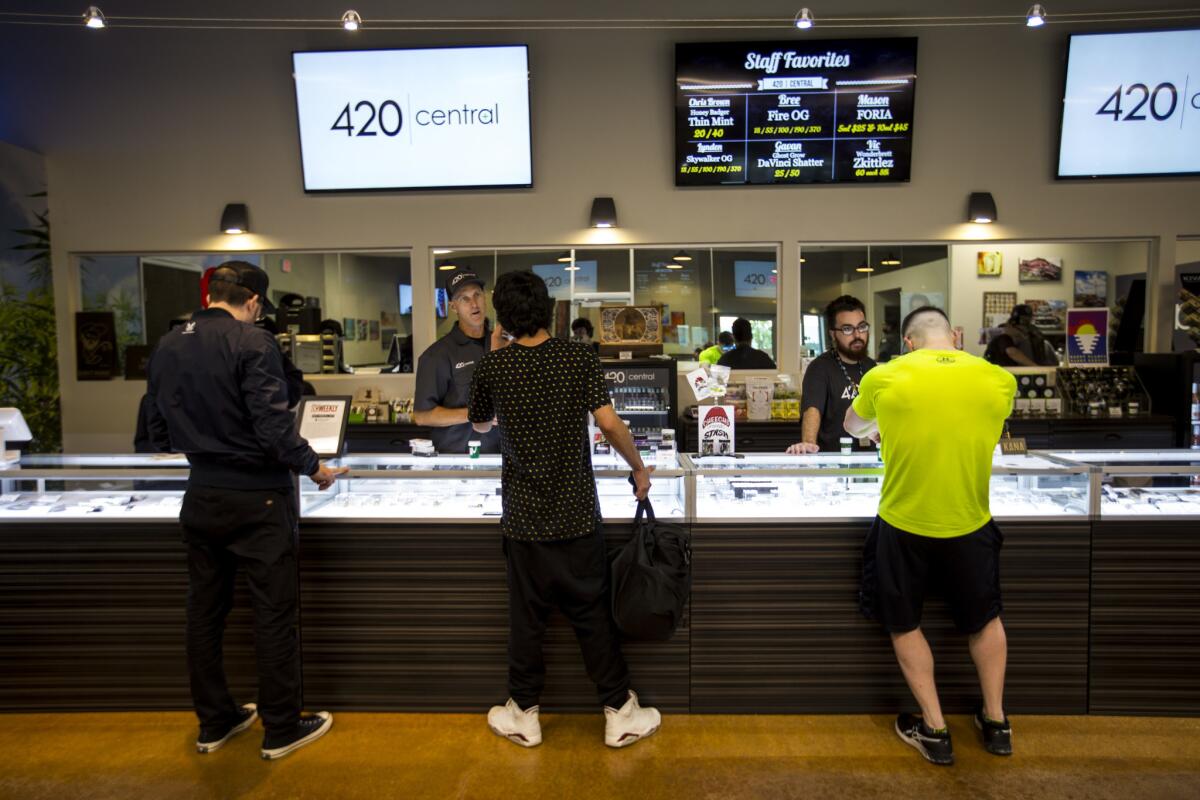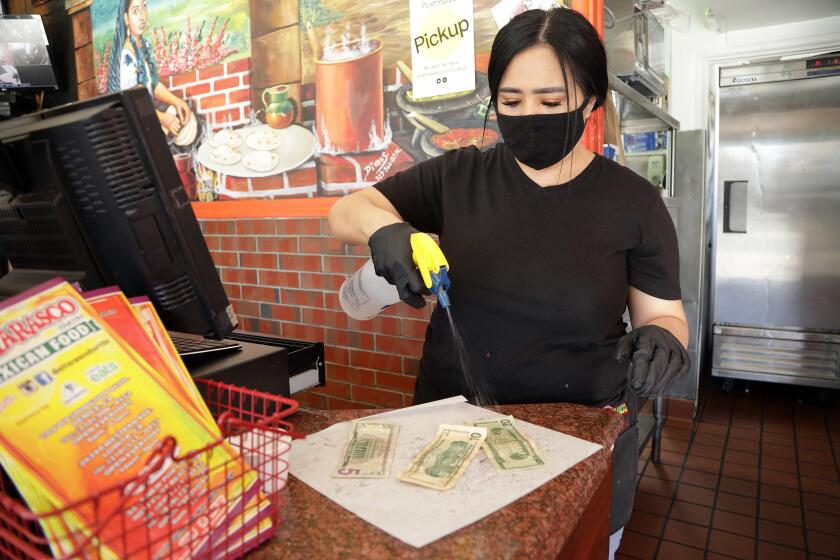California pot dispensaries are open during coronavirus crisis. Some want them closed

- Share via
SACRAMENTO — In designating California’s marijuana industry as essential under the state’s COVID-19 stay-at-home order, the administration of Gov. Gavin Newsom has argued that the health benefits of keeping pot shops open outweigh the risks — even as opponents of the policy call it reckless.
Critics say it doesn’t make sense to allow people to congregate at cannabis stores, increasing the chance of infection, so they can buy products that are smoked at a time when the virus is attacking respiratory systems.
Other states have restricted sales to those for medical needs or to deliveries, seeking to limit cannabis store crowds at a time when residents are being told to stay in their homes and practice social distancing.
But in his March 19 statewide order shuttering most businesses and directing residents to remain at home, Newsom exempted those deemed by the state public health officer to be “Essential Critical Infrastructure Workers,” who “protect health and well-being of all Californians.”
In accordance with Newsom’s order, the health officer issued a list of essential employees who can stay on the job including those in grocery stores, welfare offices, power plants, hospitals, pharmacies and cannabis retailers.
Cannabis dispensaries and related healthcare services are considered ‘essential services’ under the order meant to stem the spread of the coronavirus.
Newsom was the leading proponent of Proposition 64, the 2016 ballot measure that legalized the sale of cannabis for recreational use in California. His administration is making the same argument he made four years ago as lieutenant governor in supporting the recommendation of the state health officer to keep marijuana stores open.
“Access to legal, regulated and safe cannabis is essential, especially for California residents who rely on cannabis as their medicine,” said Nicole Elliott, the governor’s senior advisor on cannabis.
Opponents of Proposition 64, including Kevin Sabet, head of the group Smart Approaches to Marijuana, said there are health risks in smoking cannabis, while pills and other medicines made from cannabis are available elsewhere for medical patients.
“Given the choice of marijuana-based FDA drugs available at pharmacies, deeming pot shops ‘essential’ makes no more sense than allowing tobacco stores,” Sabet said.
The state’s decision to allow stores to stay open was a welcome reprieve for California’s cannabis industry, which has been struggling to compete with the black market. Licensed growers and sellers say they have been hurt by high taxes, strict regulation and the refusal of most cities in the state to allow pot shops.
The state has 1,100 licensed retail stores and home delivery firms and many have seen a surge in sales since the COVID-19 outbreak began. During the nine-day period ending March 21, average daily sales were up 40% compared to the first two and a half months of the year, according to BDS Analytics, a firm that tracks cannabis transactions. Home deliveries are also up significantly.
The rush of buyers ranges from “people with chronic medical needs including pain, to people who just need to relax in a time of great anxiety,” said Roy Bingham, co-founder and CEO of the company.
He said his firm found that uncertainty over the future availability of cannabis also had people buying 25% more than they typically do to stock up.
Anxiety over future access to cannabis has been spurred by reports of tougher rules in other states. Massachusetts has banned sales for recreational use, limiting stores to providing medical marijuana, while Nevada is only allowing deliveries, barring in-person sales. Michigan sales must be done curbside or by delivery.
California’s order leaves room for cities and counties to adopt tougher standards that could require the closure of pot shops, some in the industry worry.
Advocacy groups including the Cannabis Consumer Policy Council are urging other cities and counties to follow the lead of Los Angeles, San Francisco, Oakland, Berkeley and others in adopting local rules to keep pot shops open.
“This is not the time to put patients or consumers at risk,” said Nate Bradley, executive director of the policy council that comprises cannabis advocates, veterans, labor leaders and business owners.
“The pandemic increases symptoms of anxiety and PTSD in our veteran population and many patients have suppressed immune systems,” Bradley added. “Forcing them into the illicit market only further puts them at risk and further burdens public safety resources.”
Assemblyman Rob Bonta (D-Alameda) said while many cannabis businesses have seen sales increase, others are struggling. One retailer in his district decided to temporarily shut its doors to protect workers and customers with immunodeficiency issues, Bonta said.
“They don’t want to risk exposure,” he said.
Los Angeles Times’ visual coverage of the coronavirus crisis
The state Bureau of Cannabis Control said retailers that continue to stay open “must adopt social distancing and anti-congregating measures,” and are required to comply with the Center for Disease Control guidelines for cleaning and disinfection of public areas.
In response, many stores, including the Higher Path in Sherman Oaks, are offering curbside service, allowing people to order cannabis online and text the business when they arrive to have the product brought out to their car.
“I’m trying to limit the amount of personal interaction of my employees with any member of the public,” said Jerred Kiloh, owner of the store. He had to get special permission from the state bureau to waive the requirement that stores conduct sales transactions in a secure indoor area.
On one recent day, Kiloh said there were 15 cars outside his store whose drivers were provided with cannabis products they had ordered, in addition to customers who went inside the store for their orders.
Still, the potential for transmission of the virus between customers and employees at pot shops is cited by some who say the state is making a mistake in allowing pot shops to remain open when bars and nightclubs have been ordered shut.
“Allowing workers to congregate to distribute this damaging and dangerous drug in the presence of this pandemic cannot be justified in the least,” said Scott Chipman, a Southern California resident who is vice president of Americans Against Legalizing Marijuana, noting that people face special risk from COVID-19 if their immune systems are impaired or they have lung or respiratory problems.
Dale Gieringer, director of the legalization group CAL NORML, called Chipman’s claims “unsubstantiated by a group that likes to blame marijuana for everything.”
Gieringer, who has written on cannabis health issues, said studies have shown chronic cannabis smoking, like all smoking, can raise the risk of respiratory infections, which are a factor in COVID-19 susceptibility. But he said that is not true of edible cannabis.
“On the other hand, it could be argued that cannabis has demonstrated beneficial anti-inflammatory effects in treating auto-immune diseases like [multiple sclerosis], rheumatoid arthritis, endometriosis, etc., in which the body is damaged by its own immune response,” Gieringer said.
While more medical research is needed on the health impacts of cannabis, some studies have raised concerns about cannabis use negatively impacting the immune system, said Dr. Donald Tashkin, a UCLA professor and director of the university’s Pulmonary Function Laboratories.
Tashkin co-authored a 2014 study published in the Journal of Clinical Pharmacology that found habitual smoking of marijuana has “a number of effects on the respiratory and immune systems.” They include “an increased prevalence of acute and chronic bronchitis” and “striking endoscopic findings of airway injury (erythema, edema, and increased secretions).”
Those who use cannabis products for non-medicinal reasons should avoid doing so during the COVID-19 outbreak, he said.
“If they are not dependent, I would advise them to stop smoking cannabis,” Tashkin said. “Smoking anything increases risk.”
Chipman said he believes the state’s designation of cannabis as an essential industry can be attributed to the industry’s political clout in the state Capitol, noting that Newsom has a political stake in seeing the legal market succeed because he led the campaign for Proposition 64.
“Gavin Newsom has had blinders on related to marijuana and its impacts on public health and safety for years,” Chipman said.
But some GOP lawmakers, including Assembly Republican Leader Marie Waldron of Escondido, are siding with the governor on the decision to keep cannabis stores operating during the pandemic.
“I agree with the state’s efforts to contain the spread of COVID-19 thus far,” Waldron said, “But I think it’s also important to keep open as many businesses as possible, as long as that doesn’t interfere with virus mitigation and employees and customers are protected.”
More to Read
Sign up for Essential California
The most important California stories and recommendations in your inbox every morning.
You may occasionally receive promotional content from the Los Angeles Times.












